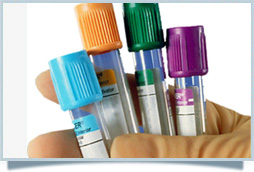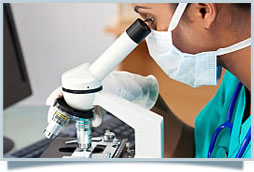
Pathology is the medical specialty concerned with the study of the nature and causes of diseases. It is the back bone of all branches of medicine. Pathology is involved in predicting, diagnosing, grading, monitoring and research related to disease. Indeed, no branch of medicine would be as interesting and challenging as Pathology.

A Clinical Pathologist is familiar with the major aspects of the clinical branches of laboratory medicine. For problems demanding specific expertise they would consult with more specialized colleagues Clinical pathology is that part of lab medicine where clinical samples are tested. This would include blood, body fluids, urine and stool examination.

Hematology is rapidly developing discipline which deals with many aspects of those diseases which affect the blood such as anemia, leukemia, lymphoma, and clotting or bleeding disorders. .
Another important activity is the management of blood transfusion services. Many hematologists are involved, not only in the laboratory diagnosis and management of patients with blood diseases, but also as clinical consultants.

Our state of art biochemistry lab has facility for a wide range of routine as well as specialized biochemical tests. Biochemistry analysis is done on A15 Biochemistry analyzer which is fully automated machine. This automated machines help decrease our turn-around-time that is critical in many medical conditions.

Histopathology is the microscopic examination of biological tissues to observe the appearance of diseased cells and tissues in very fine detail. This helps a great deal in diagnosing disease in surgically excised specimens. Many special techniques like immunohistochemistry are also used in histopathology.

Cytology involves study of cell morphology. This is done aspirating cells from tissues with a needle. Cytology as an investigation modality is very popular these days. This is because of its non invasive nature. It can be done as an OPD procedure.
PAP smear cytology is done in women as part of cervical cancer screening.